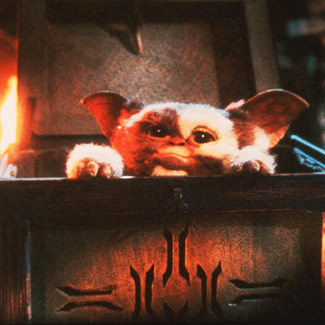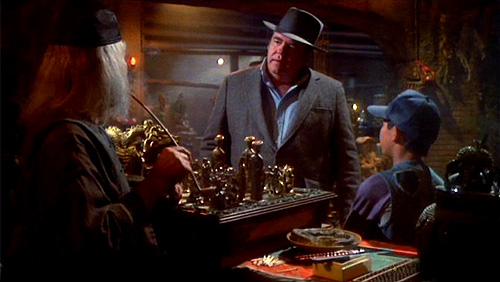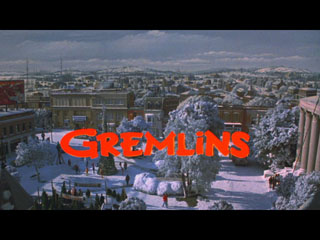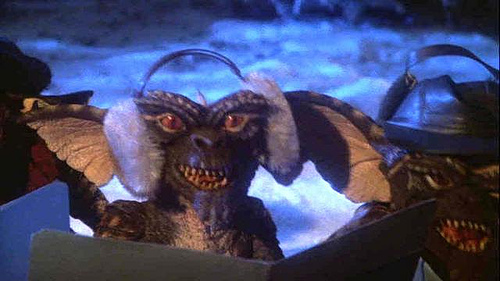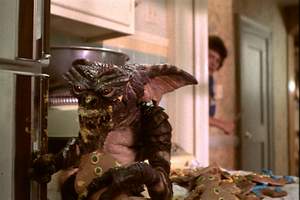This review, featured on the cover, appeared in the December 1985 issue of Video Times. I was living in Santa Barbara at the time, and not long after it came out, I met Joe Dante for the first time, in Los Angeles (at a party given by Todd McCarthy); he’d recently read this review, and, as I recall, told me that he liked it. — J.R.
Gremlins ***
As a producer and director, Steven Spielberg seems limited to two subjects: power and magic. The power that interests him is, of course, the power that he commands, and the magic is that of his medium. Put these together and add the input of director Joe Dante, another film buff, and you get a movie about movies, triple-distilled. And the curious achievement of Gremlins is that it makes such self-absorption commercially viable, at the same time that it refuses to conform to any single, sustained social meaning. Much as the depiction of Vietnam in Coppola’s Apocalypse Now was designed to placate hawks and doves alike, gremlins is cleverly contrived to please skeptics as well as believers, optimists as well as pessimists about the American way of life. Thanks to a disconnected episodic structure that suggests several separate movies crammed together — a strategy that re-creates the fragmented, discontinuous flow of TV watching — viewers of Gremlins are invited to chart out their own justifications for enjoying Dante and Spielberg’s treasure trove.
One justification is offered by the movie’s plot, which gives us a cautionary Christmas fable set in a Frank Capra universe. Rand Peltzer (Hoyt Axton), a good-natured and kind-hearted inventor whose inventions seldom work, buys a furry little animal named Mogwai for his son Billy (Zach Galligan) from a Chinatown curio shop. He is warned that three rules of gremlin maintenance must be followed: Keep them out of light, don’t ever get them wet, and above all, never feed them after midnight. But after Billy inadvertently breaks all these rules, Mogwai replicates into several more gremlins, who evolve into sinister beasts. They multiply further, taking over the town — and Billy must try to stop them. To seal the high moral tone, The wise old Chinese merchant finally emerges to reclaim Mogwai, implying that Westerners lack the maturity to deal with such magical creatures.
So much for the moral, upstanding movie some viewers want, which Gremlins dutifully supplies. What about the film’s immoral, irresponsible aspects? Are viewers interested in these also? The filmmakers seem to think so. Gremlins offers them in such abundance that it conjures up a second movie, diametrically opposed to the first, which delights in assaulting everything the other movie stands for: Christmas, Norman Rockwell’s America, consumer society, family entertainment, and so on. And while the moral side of Gremlins can be taken in two possible ways (as sincere or cynical), the amoral side seems to break up like the gremlins themselves into an infinity of possible meanings. The evil beasties can be plausibly read at various times as (a) adolescents, (b) blacks , (c) Native Americans, (d) good ole boys, (e) people who like Walt Disney (or Steven Spielberg) movies. (f) mischievous kids, (g) hoboes, (h) monsters — anyone can add to the list.
Because Dante concentrates so much on individual shots and ideas and so little on overriding concepts, Gremlins seems ideally suited for home video. As an inspired (if unruly) collection of bits, it virtually cries out for the pause button — not to mention forward and backward searches. Film freaks can freeze-frame in order to pinpoint the multiple movie references. Splatter hounds can leapfrog from one flamboyant, grisly death to the next. Special-effects aficionados can linger on the loving gremlin crowd scenes, in a tavern, movie theater, and elsewhere.
Sometimes the most subversive and complex thing to do in a Hollywood movie is to give audiences exactly what you think they want, never hesitating to pursue the resulting contradictions to the limit. Perhaps no viewer can swallow the concoction whole without incurring a little bit of heartburn; but each is guaranteed to get more than he or she bargained on.
— JONATHAN ROSENBAUM
Gremlins (1984). C, Director: Joe Dante. With Hoyt Axton, Zach Galligan, Phoebe Cates, and Frances Lee McCain. 106 min. PG. (Closed Captioned.) Hi-Fi. Warner, $79.95. Laser: $34.98.
— Video Times, December 1985

